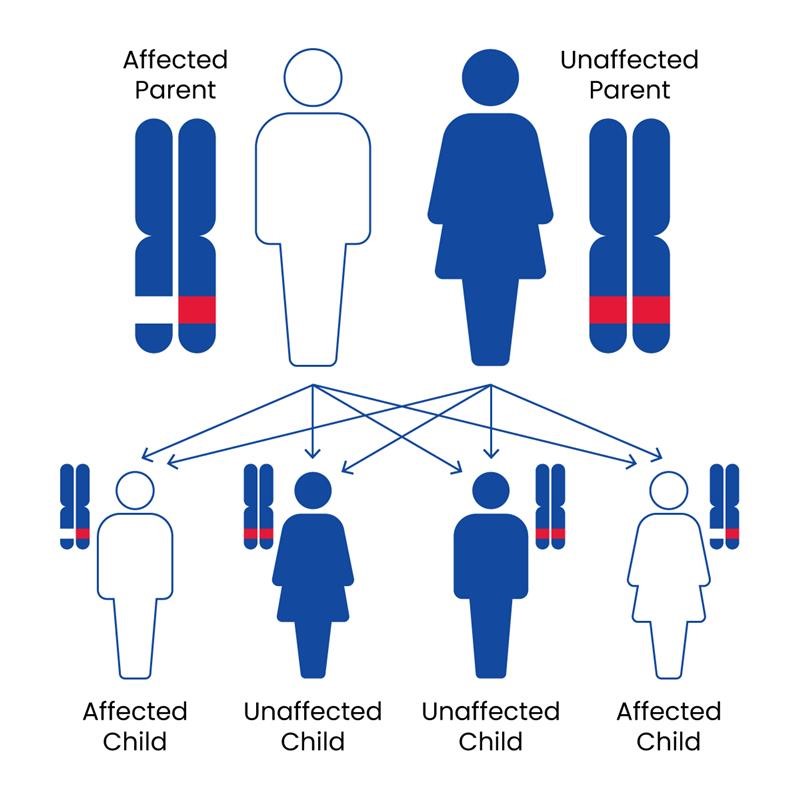What is Hereditary Cancer?
Hereditary cancer, also known as inherited or familial cancer, refers to cancers caused by genetic mutations passed down from parents to their children. These mutations increase the risk of developing certain types of cancer, often at younger ages than typical. It is estimated that 5-10% of all cancers arise from hereditary mutations.

Who should get tested?
Hereditary Cancer testing may be appropriate if you or a close family member has:
- Breast, colorectal, or uterine cancer diagnosed before age 50
- More than one type of cancer
- Cancer in both of a set of paired organs (for example, both kidneys or both breasts)
- Certain types of cancer including ovarian, pancreatic, metastatic prostate, intraductal prostate, medullary thyroid, triple-negative breast or male breast cancer
- 10+ gastrointestinal polyps
- Breast or high grade prostate cancer (Gleason score >7)
- Ashkenazi Jewish ancestry
- Or if you are curious to understand your risk of developing hereditary cancer
If you have difficulty urinating, pelvic pain, or blood in urine, please consult a healthcare provider directly.


What is the Hereditary Cancer Panel?
This simple blood test analyzes 84 genes linked to hereditary cancer, helping you get a clear picture of your risk of developing a hereditary cancer. It also includes pre- and post-test genetic counselling, so you'll gain a deeper understanding of your health and the steps you can take to stay ahead.
This test is used to:
- Guide surveillance, prevention, and medical management decisions regarding cancer
- Provide opportunities to detect cancer early and improves potential outcome
- Clarify risks to family members
- Facilitate important discussions with family members
Please note that the gene list is subject to change over time. Most up to date information will be listed in the results report.
Order a test today
Order the test from the comfort of your home.
Test Details
-
Speak to your health care provider:
Download our patient discussion guide to start the conversation with your health care provider and find out if this test is a good fit for you.
Get your requisition signed by your health care provider:
You have two options:
- Option 1: Purchase the test online, then have your health care provider sign the emailed requisition form before booking your appointment.
- Option 2: Download the requisition form, have it signed by your health care provider, and pay for the test at your LifeLabs appointment.
Book Your Appointment: Once you have your requisition form signed, schedule a blood draw at your nearest LifeLabs location.
Get Tested: Visit LifeLabs at your scheduled appointment time to have your blood drawn.
Receive Support: Benefit from pre- and post-test genetic counselling to guide you through the process.
Get Your Results: You can expect your results within 4 to 6 weeks. Results will be disclosed during your post-test counselling appointment. Results will be sent to your health care provider and can be sent to you via encrypted email.
Our process is designed to be straightforward and supportive, ensuring you have the guidance you need every step of the way.
Timing estimates do not include time required for healthcare provider appointments, requisitions, consent signatures, sample collection, or courier/shipping times.
-
Results documentation includes the following:
- A summary of the pre-test genetic counselling session for the patient and the ordering physician
- A copy of the result with an explanatory letter for the patient* and the ordering physician.
Possible results include:
- Positive: A disease-causing mutation was identified. This individual has an increased risk for specific types of cancer. Family members are at increased risk of carrying the same mutation.
- True Negative: This individual tested negative for a mutation previously identified in the family. This individual’s risk for cancer is not expected to be increased above the general population risk.
- Uninformative Negative: No disease-causing mutation was identified. If an individual has a personal or family history of cancer, the exact cause of the cancers in the family remains unknown. This individual’s risk for cancer remains increased based on family history assessment. If applicable, testing affected family members could be considered.
- Variant of Unknown Significance (VUS): A VUS indicates that the pathogenicity (whether a mutation causes a predisposition to cancer) of the variant identified cannot be established. Testing other family members may help clarify the clinical significance. Over time, variants may be reclassified as pathogenic or non-pathogenic.
*Note: the ordering physician has the option to opt out of patients receiving results directly. If this is the case, the patient will be notified that their results are ready and to contact their ordering physician.


 Return to collection guide
Return to collection guide


